
Brideshead Revisited: The Sacred & Profane Memories of Captain Charles Ryder is a novel by English writer Evelyn Waugh, first published in 1945. It follows, from the 1920s to the early 1940s, the life and romances of the protagonist Charles Ryder, most especially his friendship with the Flytes, a family of wealthy English Catholics who live in a palatial mansion called Brideshead Castle. Ryder has relationships with two of the Flytes: Sebastian and Julia. The novel explores themes including Catholicism and nostalgia for the age of English aristocracy. A faithful and well-received television adaptation of the novel was produced in an 11-part miniseries by Granada Television in 1981.

Michael Christopher Sheen is a Welsh actor. After training at London's Royal Academy of Dramatic Art (RADA), he worked mainly in theatre throughout the 1990s with stage roles in Romeo and Juliet (1992), Don't Fool with Love (1993), Peer Gynt (1994), The Seagull (1995), The Homecoming (1997), and Henry V (1997). His performances in Amadeus at the Old Vic and Look Back in Anger at the National Theatre were nominated for Olivier Awards in 1998 and 1999, respectively. In 2003, he was nominated for a third Olivier Award for his performance in Caligula at the Donmar Warehouse.
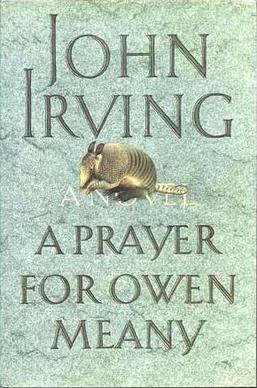
A Prayer for Owen Meany is the seventh novel by American writer John Irving. Published in 1989, it tells the story of John Wheelwright and his best friend Owen Meany growing up together in a small New Hampshire town during the 1950s and 1960s. According to John's narration, Owen is a remarkable boy in many ways; he believes himself to be God's instrument and sets out to fulfill the fate he has prophesied for himself.
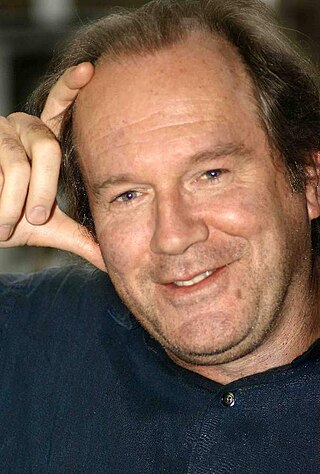
William Andrew Murray Boyd is a Scottish novelist, short story writer and screenwriter.
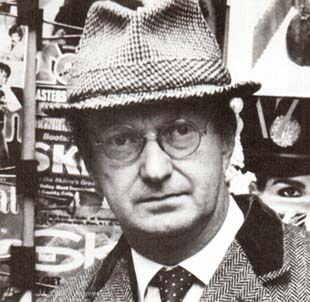
Auberon Alexander Waugh was an English journalist and novelist, and eldest son of the novelist Evelyn Waugh. He was widely known by his nickname "Bron".
Michael Wharton was a British newspaper columnist who wrote under the pseudonym Peter Simple in the British Daily Telegraph. He began work on the "Way of the World" column with illustrator Michael ffolkes three times a week in early 1957, and wrote the column four times a week for a lengthy period ending in 1987. On 13 May 1990 he began a weekly Peter Simple column in the Sunday Telegraph, before returning to the Daily Telegraph as a weekly columnist on 8 March 1996. He remained there until his death, aged 92, in 2006, his last column appearing on 20 January 2006.

John Gambril (Francis) Nicholson (1866–1931) was an English school teacher, poet, and amateur photographer. He was one of the Uranians, a clandestine group of British men who wrote poetry idealizing the beauty and love of adolescent boys. As a school master at various boarding schools in England and Wales, Nicholson formed "passionate friendships" with some of his students, and dedicated much of his poetry to favoured students.
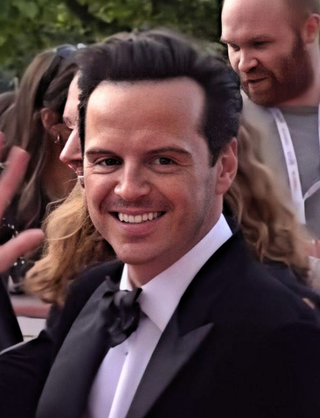
Andrew Scott is an Irish actor. He played Jim Moriarty in the BBC series Sherlock, for which he won the BAFTA Television Award for Best Supporting Actor. Scott's role as the priest on the second series of Fleabag earned a nomination for the Golden Globe Award for Best Supporting Actor – Series, Miniseries or Television Film and won the Critics' Choice Television Award for Best Supporting Actor in a Comedy Series. He won further acclaim playing the lead role of Garry Essendine in a 2019 stage production of Present Laughter at The Old Vic, for which he won the Laurence Olivier Award for Best Actor in a Leading Role in a Play.

Rydal Penrhos School is a private day school in Colwyn Bay, North Wales. It is the only Methodist school in the independent sector in Wales. It is located on multiple sites around the town with a site in the neighbouring village of Rhos-on-Sea where it keeps its watersports equipment for easy access to the beach.
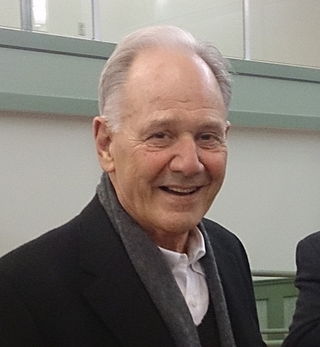
Alexander McPhee Miller is an Australian novelist. Miller is twice winner of the Miles Franklin Award, in 1993 for The Ancestor Game and in 2003 for Journey to the Stone Country. He won the overall award for the Commonwealth Writer's Prize for The Ancestor Game in 1993. He is twice winner of the New South Wales Premier's Literary Awards Christina Stead Prize for Conditions of Faith in 2001 and for Lovesong in 2011. In recognition of his impressive body of work and in particular for his novel Autumn Laing he was awarded the Melbourne Prize for Literature in 2012.

Faith Healer is a play by Brian Friel about the life of the faith healer Francis Hardy as monologued through the shifting memories of Hardy, his wife, Grace, and stage manager, Teddy.

The Ordeal of Gilbert Pinfold is a novel by the British writer Evelyn Waugh, first published in July 1957. It is Waugh's penultimate full-length work of fiction, which the author called his "mad book"—a largely autobiographical account of a period of hallucinations caused by bromide intoxication that he experienced in the early months of 1954, recounted through his protagonist Gilbert Pinfold.

John Boyne is an Irish novelist. He is the author of fourteen novels for adults, six novels for younger readers, two novellas and one collection of short stories. His novels are published in over 50 languages. His 2006 novel The Boy in the Striped Pyjamas was adapted into a 2008 film of the same name.
Philip Michael Hensher FRSL is an English novelist, critic and journalist.

William Benedict Herbert Nightingale is a British journalist, formerly a regular theatre critic for The Times newspaper. He was educated at Charterhouse and Magdalene College, Cambridge. His first published theatre review was for the Tunbridge Wells Advertiser in 1957, a production of Look Back in Anger by a local amateur group.
Adam Thorpe is a British poet and novelist whose works also include short stories, translations, radio dramas and documentaries. He is a frequent contributor of reviews and articles to various newspapers, journals and magazines, including the Guardian, the Poetry Review and the Times Literary Supplement.
Richard Dillane is a British actor. He appears in Soldier Soldier (1995), Cold Feet (2000), Space Race (2005), Tristan & Isolde (2006), Spooks (2007), Casualty (2008-2009), Oranges and Sunshine (2010), Doctor Who (2011), Argo (2012), Dead in Tombstone (2013), Wolf Hall (2015), Peaky Blinders and Poldark (2016), Giri/Haji (2019), Young Wallander (2020),The Crown and Andor (2021).
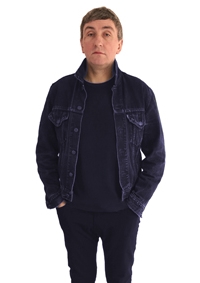
Roy Smiles is a singer-songwriter & playwright from Ealing, West London. He is also an occasional actor.

Jonathan Stuart Bailey is an English actor. Known for his comedic, dramatic, and musical roles on stage and screen, he is the recipient of a Laurence Olivier Award and a nomination for a Evening Standard Theatre Award.
Philip Ishak Arditti is a Turkish-British theatre and television actor of Italian and Turkish Jewish Sephardic descent, famous for his role as Uday Hussein in the four episode House of Saddam television docudrama. He also appeared in the film Red 2, a sequel to 2010's Red. He was part of the team that founded the Arcola Theatre in London.













